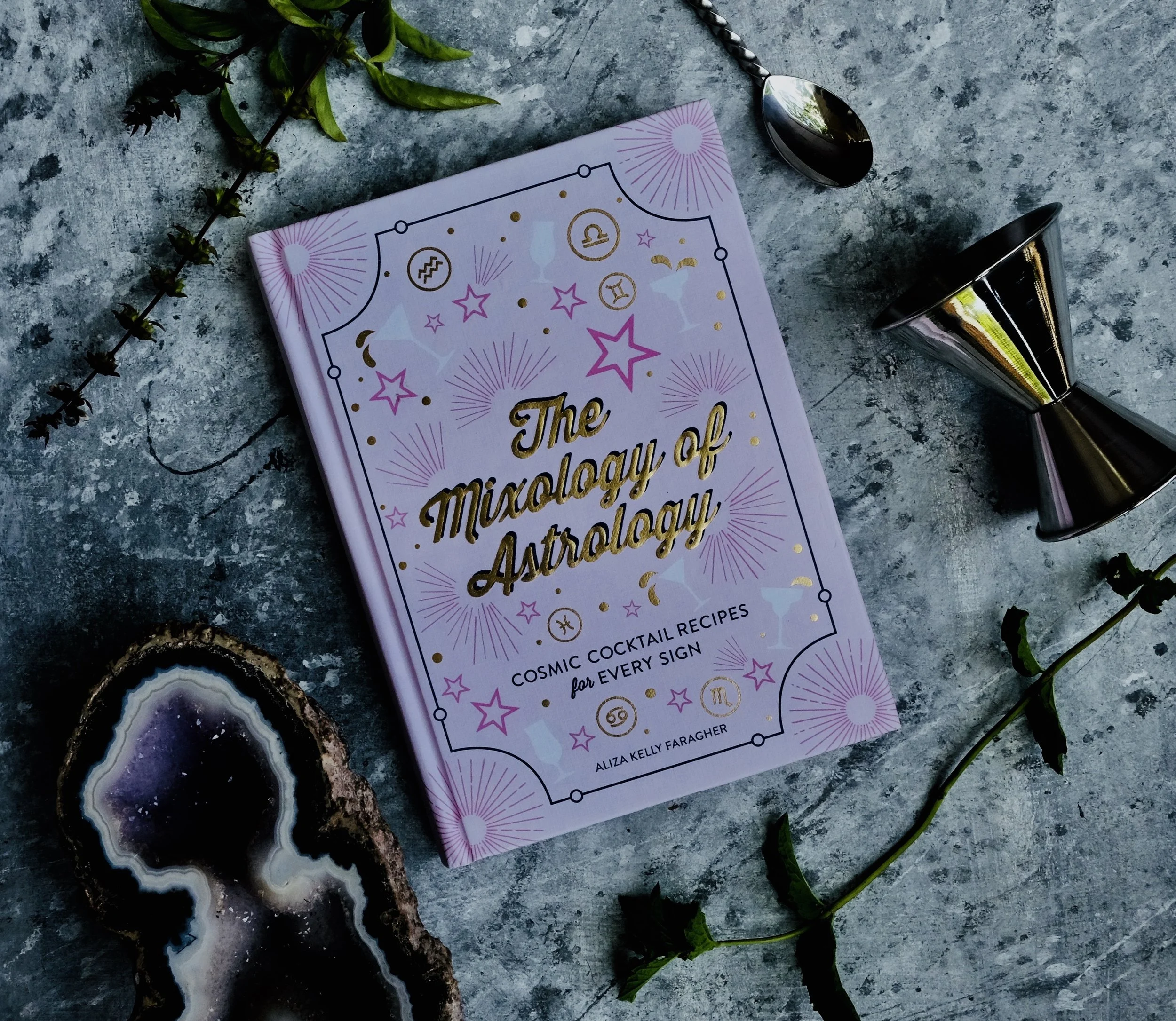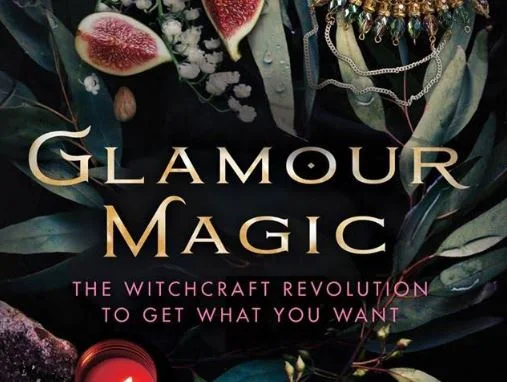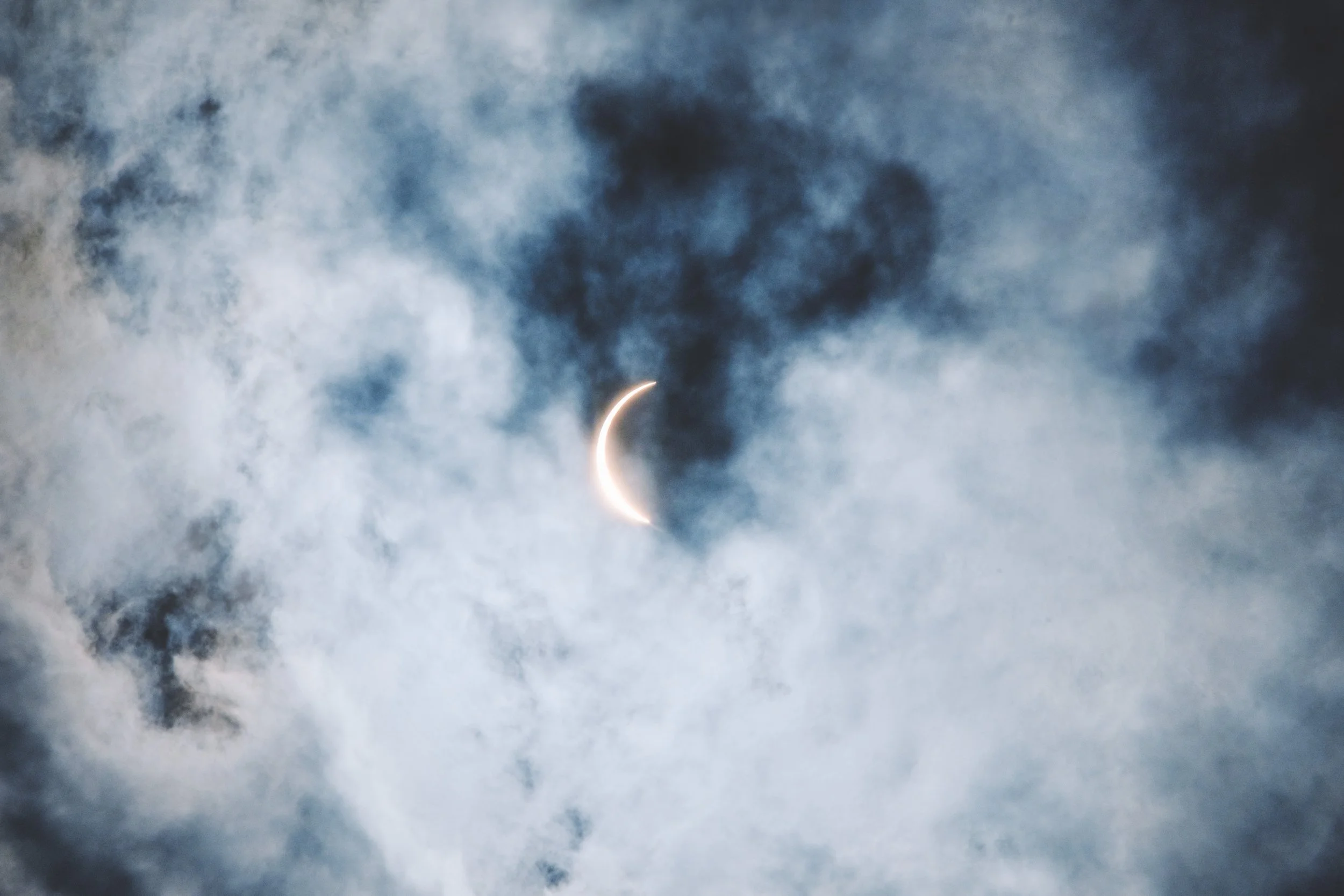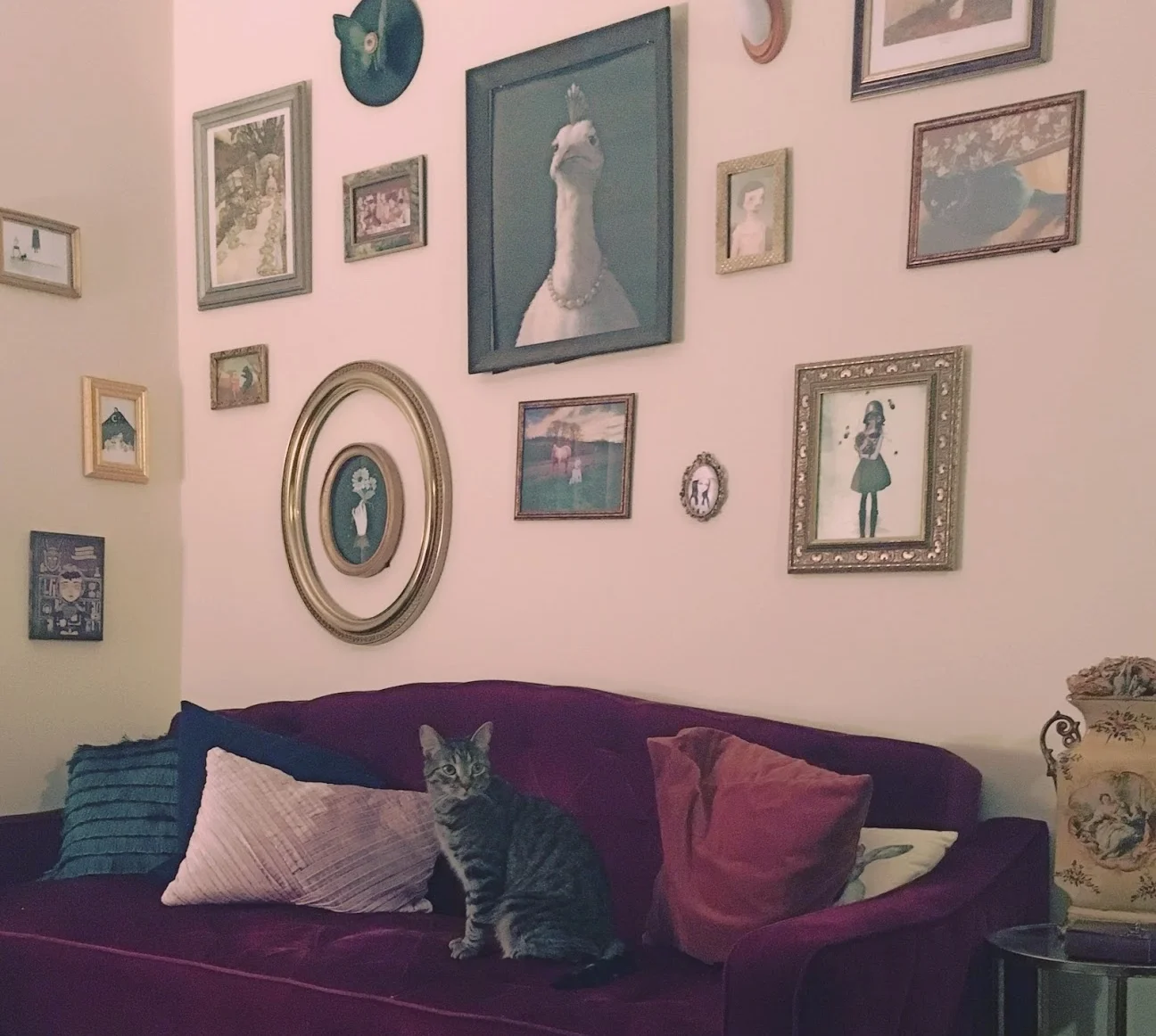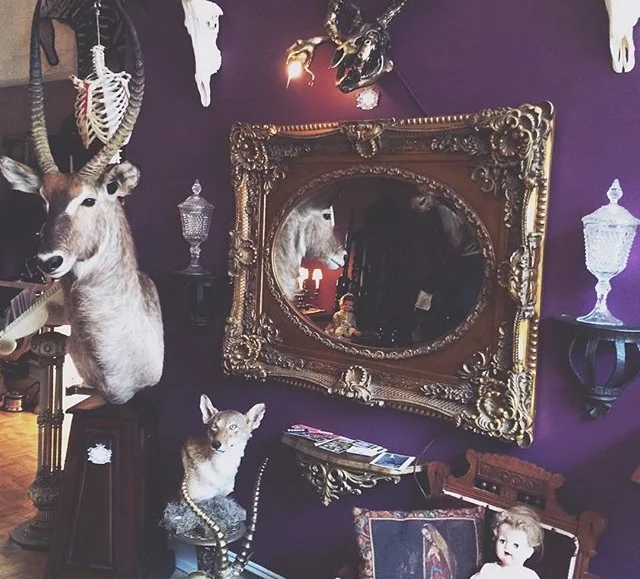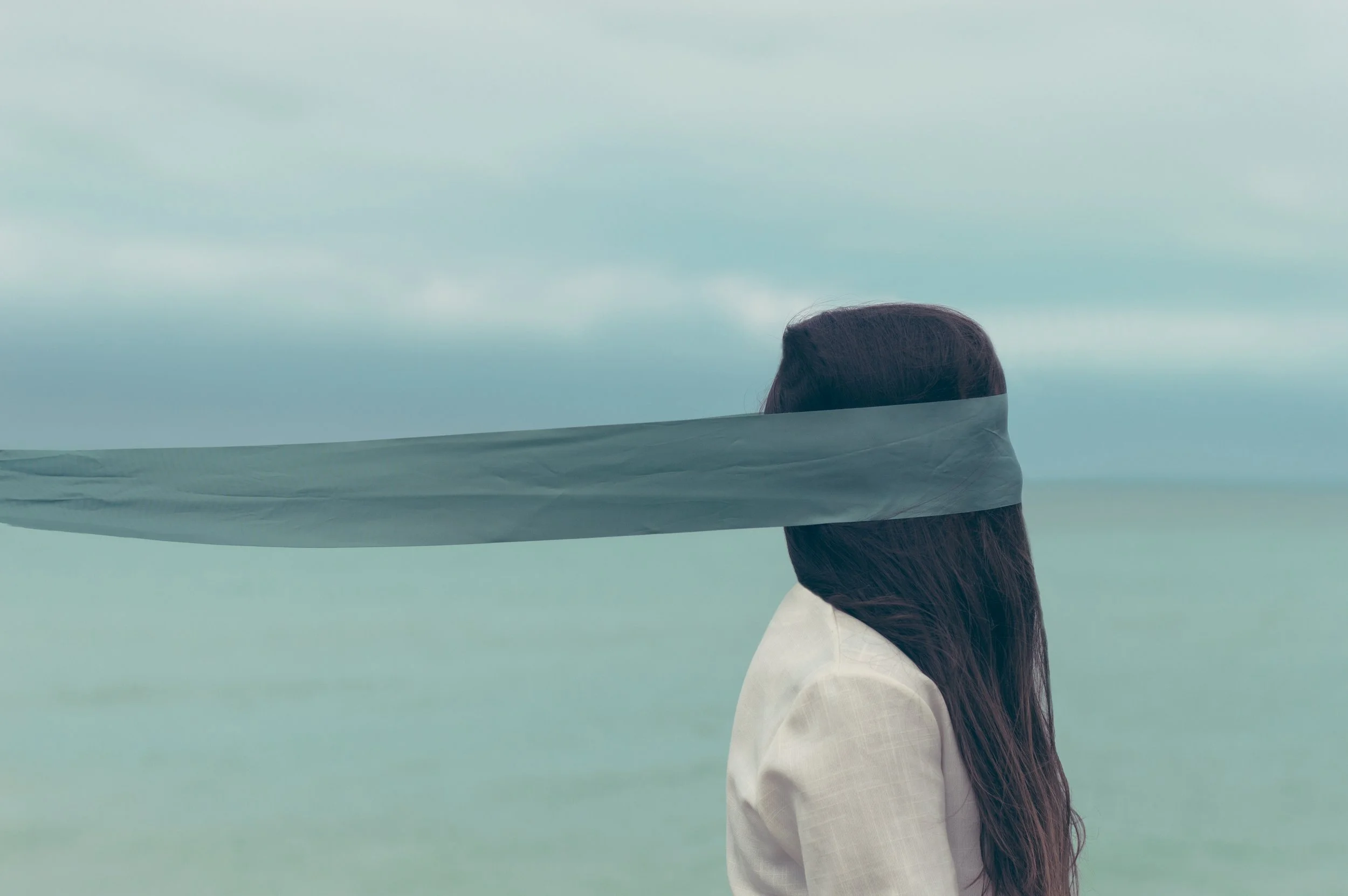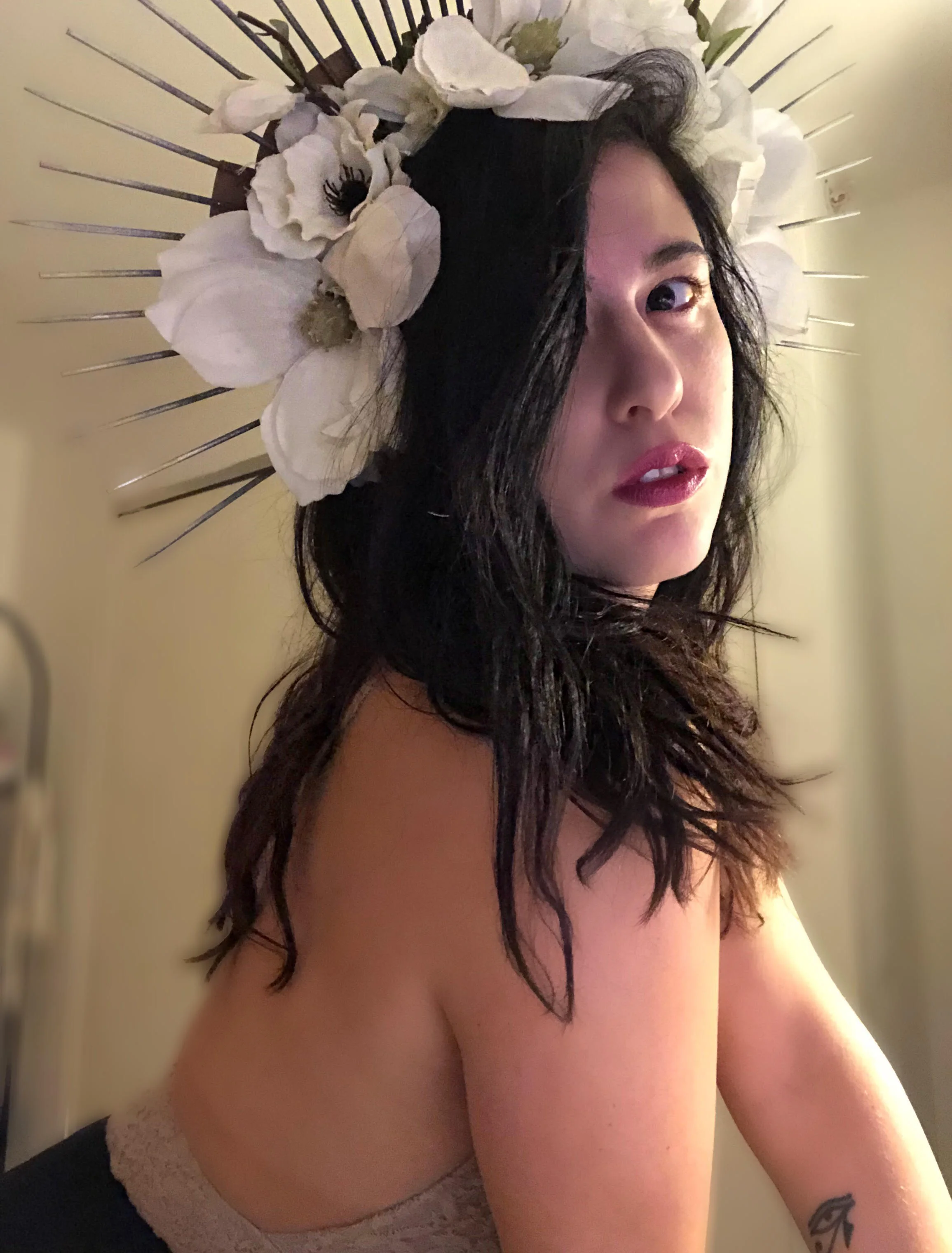And crafting scent, as perfumer Claire Baxter proclaims on her website, is an aromatic art. Claire is the founder behind the Texas-based fragrance shop, Sixteen92. Taking its name from the year of Salem Witch Trials, Sixteen92 crafts small batch fine fragrances inspired by literature, lore, and history.
Read MoreReview of 'The Mixology of Astrology': Cosmic Cocktail Recipes for Every Sign
So, whether you are just looking to explore astrology more, new to mixology, or a veteran star-gazer who knows your way around a shaker and has muddler or two among your spirited potions, this hardback book is a beautiful (the cover art is STUNNING!) addition to your library or would make a marvelous gift for a cosmically-inclined friend.
Read MoreGlamour Magic, Identity, & Self Love with Author Deborah Castellano
“I think that the most feminist thing you can do in life is to not let other people (unsolicited) tell you how to present yourself to the world. “
Read More4 Witchy Podcasts You Need In Your Life
BY LISA MARIE BASILE
The podcast is a strange animal. Music is usually the go-to while traveling or doing work, while books pass the time and fill our lives with beauty. But where do podcasts fit in? Do they require less or more work? Maybe both? They're educational, entertaining, and reminiscent of a time when broadcast radio floated like music throughout the home. You can simply play one and let all fall away.
Luckily, podcasts exist for every single nook and cranny of the Internet and all the different weirdos surfing it. For us witches, we've got a bevy of wonderful options. Not only do these podcasts serve as a reminder that we're not alone, they truly teach us. They bring us together. They enlighten us on practices, beliefs, and cultures. They create a little bright world where we can grow as practitioners and people. And they're fun.
Here are my favorites:
The Fat Feminist Witch is one of my favorite podcasts, maybe ever. I adore Paige, the host, who is not only well-versed in witchcraft and magical practices, but regularly approaches issues relating to mental health, the body, race and culture, and wellness. Her personal touch is moving and complimentary, and contextualizes the podcast's focus on modern witchcraft. This is what a real witch thinks about and feels and considers, one might think while listening. On top of that, her guests are interesting, her book reviews are stellar, and her off-the-cuff conversations are enlightening, intersectional, and emotionally open. And funny!
A recent favorite episode: Glamour Magick with Deborah Castellano
The Witch Wave is an excellent podcast for those witches and learners who want a deep dive. Pam Grossman, its host, carefully curates her podcast--ensuring diversity both in its guests and its topics. While she always makes an effort to clarify ideas, beliefs, or words, the questions asked aren't all easy or foundational. She digs deep with her guests and gets to the roots and nuances of the conversation, exhuming ideas that may not be widely spoken about and pressing for more. What you come away with is a comprehensive look at a given topic and a sense of true humanity and context. Pam Grossman is thoughtful, generous, and open-minded in a magical way, and her guests are always the same.
A recent favorite episode: Jessyka Winston of Haus of Hoodoo
The Serpent Cast is an explosion of awesome in every.single.episode. This podcast blends sex-positive talk and the spiritual (which is a perfect and necessary combo). Hosted by Annabel Gat and Sophie Saint Thomas, they'll cover everything from witchcraft and herbs to gender and sex toys. It's funny, fun, smart, enlightening and sexy. Oh, and I once won a sex toy from them via an Instagram contest. They made my damn day.
A recent favorite episode: Sonia Ortiz, Medium, Tarot Reader, and Artist
Hippie Witch: Magick for a New Age with Joanna DeVoe is one of my favorite podcasts--not only because it's ripe with excellent information on every aspect of the occult, but because its host (Joanna) is kind, thoughtful, balanced, honest, and truly interested in giving space and voice to all sorts of ideas and beliefs. She's funny (like, very), quirky (expect a live and let live style to this podcast), highly intuitive, and deeply empathic. You'll learn about everything from faeries to moon magic to creativity to spirit guides. She interviews dozens of folks, including authors and witches, and she's even interviewed me about my forthcoming book, Light Magic for Dark Times.
A recent favorite episode: Cultural & Personal Shadows Revealed Online
Lisa Marie Basile is the founding creative director of Luna Luna Magazine—a digital diary of literature, magical living and idea. She is the author of "Light Magic for Dark Times," a modern grimoire of inspired rituals and daily practices. She's also the author of a few poetry collections, including the forthcoming "Nympholepsy." She has written for The New York Times, Narratively, Grimoire Magazine, Sabat Magazine, The Establishment, Refinery 29, Bust, Hello Giggles, and more. Lisa Marie earned a Masters degree in Writing from The New School and studied literature and psychology as an undergraduate at Pace University.
El Greco’s Adoración de los Reyes Magos (1568)
Reviving the Magical Life and Times of the Three Kings
BY COOPER WILHELM
A little before my time, the story goes, the church at the end of the street commissioned a local artist to paint the stations of the cross, and when he did he surprised everyone by including the church elders in the paintings as apostles, townspeople, Roman soldiers, and the like. The story also goes that, although they still kept the paintings, being included in them made the church elders upset. Back when I still went to church, the culture of the church at the end of the street maintained a separation between church stories and church gossip. The Bible was long ago, your life was your life, and it would be frankly rude and a little creepy to discuss any relationship between the two in any detail.
So, when the pastor allegedly rode off on his motorcycle with the choir master’s daughter, leaving behind questions about a significant amount of money missing from the church coffers (so the scuttlebutt goes, I can’t confirm any of it), it is likely no one drew comparisons between that and, say, the Exodus or something in Revelations. And it similarly stands to reason that when a congregation of Georgian immigrants joined the church, and three of them subsequently performed as The Three Kings during the yearly nativity play, many didn’t think much of the significance of this beyond the fact that “We Three Kings” sounds significantly better in Russian.
But the significance of these Kings, and significance of coming to embody them or any other figure in this direct way is clearer now after having read an excellent new book by Alexander Cummins: A Book of the Magi: Lore, Prayers, & Spellcraft of the Three Holy Kings, volume 3 in Revelore Press’s Folk Necromancy in Transmission series. A broadly researched and well-crafted exploration, Cummins’s book demonstrates the ongoing relevance of the Three Kings over the last millennium and a half, and offers a surprisingly practical guide for including them in your own spellcraft.
Cummins begins with a racing review of 1500 years of Three Kings lore, showing how as the first to bow before Christ and thus the first to demonstrate proper Christian devotion, their position in Christian discourse was frequently ancestral. Although they were not saints per se, and not really Christian either, the Kings still became venerated as holy models for Christian piety, and became the subjects of shrines and pilgrimages.
In time, the Kings came to exist in a space that might blur the present-day lines between worship and witchcraft. Early Christian pilgrims would make or use eulogiae of the Kings, which came in different forms including essentially talismanic clay amulets featuring images of the kings and made from the soil of sites holy to them. Often these clay tablets would be crushed and swallowed in the hopes of benefiting from their miraculous properties. Cummins also lays out how the Kings’ following a star was used during the Renaissance as a model of a kind of Christian astrology to validate astrology as an acceptable and holy art.
This ancestral role the Kings played also went beyond the spiritual and into the political. Spanish colonists in the New World made use of the idea that the Kings, having come from the four corners of the earth to adore the Christ child, could be viewed as universal ancestral figures representing all peoples of the world to claim that colonized peoples had ancient connections to Christianity that they had merely forgotten. In so doing, Cummins argues, missionaries gave themselves the horrifying added rhetorical power of retroactively colonizing the dead in addition to colonizing the living.
But, Cummins argues, these “efforts to convert native populaces gave [colonized peoples] mythic structures that could be adopted to challenge that very colonising authority.” The colonized, in being told that The Kings had been pilgrims from their own lands, were then able to use The Kings to claim their right to be kings themselves. During yearly Epiphany celebrations honoring The Kings, colonized peoples took up the European practice of dressing as the Kings and demanding tribute, to the anxiety of colonial authorities. In 1609, rumors began to circulate through Mexico City that black residents had chosen the night of the Epiphany to elect their own kings in a symbolic challenge to colonial authority. These symbolic acts of reclaiming power became, in Cummins’s telling, a source of fear in the hearts of local colonial rulers: “The shackles placed by colonial masters upon the ancestors of their servants and slaves had been thrust into the fire of their nightmares and had been forged back into crowns.”
The treatment of this particular aspect of the history of The Kings can feel a bit quick, and might well leave the reader asking for more detail, especially into how the politics of the use of The Kings in anticolonial activity evolved. But the primary focus of A Book of the Magi is how, as ancestral magicians, the Kings came play a role in traditions of magic and sorcery, and for this Cummins collects and lingers over a number of great finds and experiments.
Jumping hither and yon in what could serve as a kind of Medieval Grimoires 101, Cummins skips through a number of different spellbooks to present examples of The Kings being invoked work wonders. Included are magical operations to, say, use The Kings and iron nails to ward off epilepsy as described in The Black Dragon, or to call upon The Kings and use “[p]ills made of the skull of one that is hanged” to cure rabies from Jean Bodin’s Of the Demon-mania of the Sorcerers and Reginald Scot’s The Discoverie of Witchcraft.
Cummins presents these in detail, and some are quite elaborate, especially the rites using The Three Kings to command spirits to bring the practitioner treasure or to transport the practitioner great distances. But the real marvel of this book comes when Cummins moves from reporting the contents of centuries-old texts and begins to describe operations that incorporate his personal research and experimentation. For Cummins is not simply a historian, but also a practicing sorcerer and diviner, offering spells “built upon [his] study of traditional Hoodoo and related folk magical methodologies, chiefly of course African-American Conjure and Latin American folk magic” and based on “discussion with professional rootworkers and Hoodooists.” And it is in this final section of the book that the idea of working with the Kings becomes much more personal and that A Book of the Magi really shines.
A magical experiment involving The Kings from Reginald Scot’s The Discoverie of Witchcraft
Here the spells take on a very practical tone, using materials one can assemble on a budget to develop tools for magical workings. Cummins offers methods for making oil for safety while traveling, incorporating the Three Kings into your altar, and invoking their help with a kind of crown: “Wear the crown when you are studying magic or searching for something. I have found this Crown assists in divination (a form of searching after all), as well as performing these sorts of magian operations.” There’s even a cake recipe.
In so doing, Cummins reveals the relative slimness of this volume for what it is: an invitation for you to pick up this journey and begin your own explorations. Whether it be the history of Three Kings lore, where any of the episodes Cummins covers in page-long summaries might warrant or already have the dedication of a full book, and any of the spells might offer a framework for you to adapt to your own needs and knowledge.
The Kings become more than something to simply be learned about or engaged with, but something to be harnessed and embodied. Much like the church elders painted into the stations of the cross of the three men singing “We Three Kings” in Russian, we might let our faces become the faces of The Kings, our voices become their voices, our tongue become their tongues, and—more vitally—we might make their power our power.
—
Cooper Wilhelm is an occultist, researcher, and poet in NYC. He is the author of three books of poetry, including DUMBHEART/STUPIDFACE (Siren Songs/2017). More at CooperWilhelm.com and on twitter @CooperWilhelm
Which Classic Winona Ryder Film Are You, Based On Your Zodiac?
Joanna C. Valente is a ghost who lives in Brooklyn, New York, and is the author of Sirs & Madams (Aldrich Press, 2014), The Gods Are Dead (Deadly Chaps Press, 2015), Marys of the Sea (The Operating System, 2017), Xenos (Agape Editions, 2016), and Sexting Ghosts (Unknown Press, 2018). They are the editor of A Shadow Map: An Anthology by Survivors of Sexual Assault (CCM, 2017), and received a MFA in writing at Sarah Lawrence College. Joanna is also the founder of Yes, Poetry, a managing editor for Luna Luna Magazine and CCM, as well as an instructor at Brooklyn Poets. Some of their writing has appeared in Brooklyn Magazine, BUST, Them, Prelude, Apogee, Spork, The Feminist Wire, and elsewhere.
Read More6 Ways To Use A Tarot Deck To Get What You Want
Joanna C. Valente is a ghost who lives in Brooklyn, New York, and is the author of Sirs & Madams (Aldrich Press, 2014), The Gods Are Dead (Deadly Chaps Press, 2015), Marys of the Sea (The Operating System, 2017), Xenos (Agape Editions, 2016), and Sexting Ghosts (Unknown Press, 2018). They are the editor of A Shadow Map: An Anthology by Survivors of Sexual Assault (CCM, 2017), and received a MFA in writing at Sarah Lawrence College. Joanna is also the founder of Yes, Poetry, a managing editor for Luna Luna Magazine and CCM, as well as an instructor at Brooklyn Poets. Some of their writing has appeared in Brooklyn Magazine, BUST, Them, Prelude, Apogee, Spork, The Feminist Wire, and elsewhere.
Read MoreHow to Create a Witchy Gallery Wall in Your Home
There seems to be a misconception that to curate a proper gallery wall, you have to spend a fortune. This couldn’t be further from the truth. Here are some tips to create your own gallery wall in a short amount of time with affordable materials.
Read MoreImage taken from Wolves of Mercy Falls
4 Dreamy Stones To Keep By Your Bedside
It is perhaps the most simple part of my nightly routine. These little stones just sit there on my nightstand, exuding their beauty and tiny imperfections, and that is where they stay. Thier role is just to rest there beside me. Yet, their simple presence is so meaningful to the ritual as a whole...the only one I can seem to keep on a regular basis.
Read MoreHow the Words of the Dead Carried Me Home
Awakening Osiris is a celebration of all dark aspects of life and the capacity we possess to overcome them. As Ellis stated, we are all Osirises, each with the ability to create ourselves again and again on our path towards spiritual truth. Through years of research, she amassed such a powerful message, one she believed the world should have.
Read More6 Witchy Spots You Must Visit in Philadelphia
4. The Strange and Unusual
This is a shop of oddities, antiques, taxidermy, and much much more. The entire shop is decorated in purple damask and velour fainting sofas. A stuffed grizzly bear wears a gold grown and lords over you as you browse through dusty ouija boards and spooky wooden dolls rocking in Victorian prams. You can spend a whole day here, flipping through the strange grimoires or asking the shopkeepers about the unique stories each object brings to the room. It’s an experience.
Read MoreOscar Keys via Unsplash
Body Ritual: Gratitude Magic
BY LISA MARIE BASILE
Body Ritual is Lisa Marie Basile's weekly column about wellness and finding healing and autonomy in ritual. You can follow her on Instagram for more on this topic. You can read the first installment, on Chronic Illness, here.
One of the things I’ve learned to accept about having a degenerative chronic illness is that I’ll always feel slightly different. You may feel this too, especially when subject to the stigma of being ill or dealing with friends, family, employers or lawmakers who don’t get it.
This is also true for anyone who has suffered some sort of body trauma, whether it is an illness or an accident or something else that happened to you. We have to manage the huge spectrum of emotion that comes along with it, be it emotional or physical. We have this animal inside of us, this strange galloping creature who wants to get out and trample the garden and go wild. That same creature is also sometimes left dejected, wandering, wilted. It’s us, and also not us—so how do you manage that? It has feelings you don’t want to have. It has needs you don't have the energy to meet.
But it also has powers you can tap into.
I wrote in my piece, Body Ritual: 12 Things I Learned About Chronic Illness piece, that feelings around the body aren’t fixed, objective or, at times, rational. But that’s to be expected—we live in these houses for our entire lives, they’re our shells, they’re the place we retreat.
That difference — the feeling of not-quite-ness, or slightly gone-bad, overripe, like a little a sachet of broken bones, like being burdened with the weight of messy genetics and ancestral trauma—is also the very core of magic, at least to me. It’s where we hold those most intense energies and feelings that can be transmuted and transformed.
Those feelings might be anger, shame, exhaustion, rage. All of them, no matter your experience, take up a huge amount of psychic space, gnawing away at your foundation—even if others can’t see. Those energies are seriously powerful, like Hecate at the gate-powerful, like the storm at sea powerful. Use them. It’s free!
Magic is the ability to direct energy, put simply. That concept is simple enough for anyone, witch or not, atheist or not, to put to use. It’s that invisible something that happens when we decide to effect change. With our will and intention, with the energy we put out and direct.
When I’m feeling overwhelmed about my illness, I try and redirect body negativity into body love, gratitude and empowerment. I won’t lie and say YAY GUYS IT ALWAYS WORKS but it does work a lot of the time. And a lot of the time it works with a bit of a magical touch.
Recognize & speak out against ableism
The first problem with how we talk about bodies is that we often insert ableism into the picture. We talk about bodies like they’re all the same, capable of the same things. They’re not. And recognizing and respecting your body and body experience as one notch on the spectrum is key—just as key as recognizing others' experiences.
You also may be chronically ill but able-bodied, and if that's the case, recognize it and fight against ableism for others. Erasing ableism from your vocabulary and mindset will allow you to better support others. Because people suffer, are sick, have disabilities, and are often made to feel alone because of this, gratitude doesn’t have to stop at gratitude. You can support others by listening to them, loudly advocating for their cause, donating your time to them or an organization, and developing ways to include them in the larger conversation. There’s magic in empathy.
Read more about ableism and disability here, by Alaina Leary and watch this video about witchcraft and disability right here.
Spend time practicing gratitude for yourself
I didn’t say “feeling” or “being grateful”—and that’s because it takes practice! Sometimes I like to jot down a few positive aesthetic and also functional things I feel about my body in a day: my thick wavy hair that I got from my Mediterranean family, my newly-formed quad muscles (from swimming), my strong biceps, my crooked teeth—I think they’re cute, and the way my body feels after stretching. I am grateful I can move, have a full range of mobility (one day I could be disabled due to my illness), and that my pain levels are somewhat manageable. I like to focus on those things and remember them when times get tough.
What do you like about yourself? Is it your resiliency? Your endless compassion for others? Your desire to eat healthy and stay fit? Do you try to walk for an hour every day? Do you love your sense of style? Find something, remember it.
Make an altar for your body
Use pictures of yourself as a centerpiece, decorate with pieces of clothing, makeup you use, your oils or perfumes—and light a few candles. Write a letter to yourself and leave it the altar. You’d be surprised by the fulfilling experience of ritualizing self care. Here's a piece I wrote about creating an altar for self-care and setting intentions.
Train yourself to look at the positive
When you get down and start feeling powerless, reroute your mentality in the moment: “what can I do?” (Versus “what can’t I do?” The 100%-serious reality here is that this won’t magically fix anything, but it will get you into the habit of self empowerment. If we have to live with body trauma or illness, learning to manage it is key.
Tap into your needs
Let yourself have what you need—at least some of the time. Rest of you need rest. Go out if you feel like you’re itching for a party. Stretch it you’re knitted up. See a doctor when you know need help. Use complementary therapies if your gut is telling you to try them.
Take a magical bath
One of the rituals I wrote about in my book, Light Magic for Dark Times (September 2018, Quarto Books) I do when I’m feeling stuck—afraid, powerless, rigidly tied down to my illness—is I get in the bathtub, maybe with a few crystals (I have a love for rose quartz; it feels so soft and pure and kind, and for smoky quartz because it is a great facilitator of wading between the darkness and the light), some Epsom salts and essential oils, and a few candles, and I just conjure the archetype of a mermaid or a sea creature—their fluid bodies, their knowledge of the depths, their ability to move between coral and wild sea flowers and threats. I like to imagine all my worries and pain as a small black ball; then I close my eyes and focus on it dissipating, floating away. It’s not easy, weirdly enough, to visualize. It’s difficult. But when you do, it’s incredibly empowering to feel yourself letting it go, and to focus on being cleansed by the water.
Shadow work
Another practice that I love but would not necessarily recommend for everyone (just because it may not resonate in a healthy way for certain folks) is visiting a cemetery—especially if you have family there. Connecting with death, being still and silent with the tombstones, is not only death-positive, helping you to reframe your experience and perception of death, but magical; you are there, with the earth, standing in a place that is the very representation of the natural human cycle. There is a realization that we all die, but that right now we are alive and living and experiencing and capable in whatever way we are capable. There is a beautiful sense of gratitude to be found here.
I say this is a way of performing shadow work because it is an experience that forces you to go in, go deeper, look into that abyss where you hold the greatest fear and uncertainty—and then sit with that, let it bloom, let it morph into a sort of peace. It can put you at peace with your body, even if it seems, on the surface, morbid.
Remember that your body is you, it is not separate. Treat it, yourself, with love. You’re a body of magic.
Lisa Marie Basile is the founding editor-in-chief and creative director of Luna Luna Magazine and community. She is the author of a few books of poetry, including a full-length collection, Apocryphal. Her book Nympholepsy (co-authored with Alyssa Morhardt-Goldstein), will be published by Inside the Castle in November 2018 and was a finalist in the 2017 Tarpaulin Sky Book Awards. She is also working on her first novella, to be released by Clash Books in 2019. Her first nonfiction book, Light Magic for Dark Times, will be published by Quarto Books in 2018.
Lisa Marie's work has appeared in the New York Times, Narratively, Refinery 29, Greatist, Bust, Bustle, Marie Claire, The Establishment, Hello Giggles, Ravishly, Marie Claire, and more. You can catch her on the podcasts Into the Dark, Essie's Hour of Love, and Get Lit With Leza. She recently received two Pushcart nominations—for her work in Narratively and The Account. She received an MFA from The New School in NYC.
Galina Krasskova
Apports and My Love of Shrines
The man told us that this is not his house, but a house he made specifically for his mother, sister, and boyfriend who have all passed. Guiding us closer, he pointed out the poetry on a giant velvet red heart, the center of the front yard. He told us his lover died in his arms, and now he was all alone. He said that he made this for the loves that he’s lost, and he smiled.
Read More3 Witchy Books to Jumpstart Your Magical Year
It is okay to give into the season and stay indoors where it is warm and snuggle in bed with your animals by candlelight with a mug of delicious tea. That if you are a creative type, you don’t have to be generating anything right now. You can use this time to absorb rather than produce. Let this be a time of inspiration collecting.
Read MoreJohan Peijnenburg
How to Celebrate/Center the Holidays around Death
Seemingly non-pagan holidays dwell in the midst of winter solstice – their roots are witches. During the darkest part of the year, when the veil is thinnest, we gather for ceremony. This is no coincidence – this is by design. While the days grow shorter and moon light lingers longer, what we really celebrate is not the birth of something or someone, but death. Capricorn season oozes with death. It is covering everything in colder temperatures and frosty layers – it is where things go to die. It is Saturnalia.
Read More































